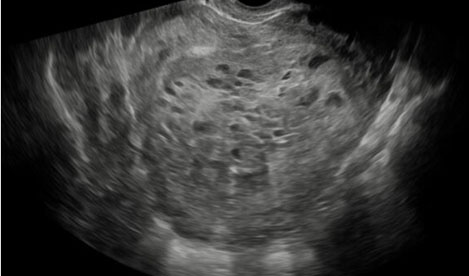 |
Case Report
Chronic ectopic pregnancy after intrauterine insemination: A case report and review of the literature
1 UConn Health, Department of Obstetrics and Gynecology, Division of Reproductive Endocrinology and Infertility, Farmington, CT, USA
2 Center for Advanced Reproductive Services, Farmington, CT, USA
3 UConn Health, Department of Obstetrics and Gynecology, Division of Minimally Invasive Gynecologic Surgery, Farmington, CT, USA
4 UConn Health, Department of Obstetrics and Gynecology, Division of Reproductive Endocrinology and Infertility, Farmington, C, USA
Address correspondence to:
Melody So
MD, Center for Advanced Reproductive Services, Division of Reproductive Endocrinology and Infertility, University of Connecticut School of Medicine, 2 Batterson Park Road, Farmington, CT 06032,
USA
Message to Corresponding Author
Article ID: 100204Z08MS2025
Access full text article on other devices

Access PDF of article on other devices

How to cite this article
So M, Koniares K, Nilsson W, Schmidt D, Luciano D. Chronic ectopic pregnancy after intrauterine insemination: A case report and review of the literature. J Case Rep Images Obstet Gynecol 2025;11(1):77–82.ABSTRACT
Introduction: Chronic ectopic pregnancy is a rare form of ectopic pregnancy characterized by repeated tubal injury and bleeding, leading to development of a chronic, inflammatory pelvic mass. Patients often present with mild, nonspecific symptoms, and a low beta-human chorionic gonadotropin (βhCG) level. Despite the established association between assisted reproductive technology and increased risk of ectopic pregnancy, this is the first reported case of a chronic ectopic pregnancy following intrauterine insemination.
Case Report: A 27-year-old primigravid female with primary infertility in the setting of polycystic ovary syndrome initially developed an ectopic pregnancy after underdoing ovulation induction and intrauterine insemination. After successful treatment with methotrexate, she was later found to have a complex pelvic mass despite a negative βhCG level, suggestive of chronic ectopic pregnancy. She underwent laparoscopic left salpingectomy with excision of adnexal mass and diagnosis was confirmed on intraoperative and histopathological findings.
Conclusion: Chronic ectopic pregnancy is a rare complication of assisted reproductive technology. Nonetheless, it should be considered in the setting of a new pelvic mass, negative pregnancy test, and recent history of ectopic pregnancy. Although conservative management is attractive, definitive treatment involves removal of the pelvic hematocele, effectively achieved through surgical intervention.
Keywords: Chronic ectopic pregnancy, Ectopic pregnancy, Intrauterine insemination, Methotrexate, Tubal pregnancy
SUPPORTING INFORMATION
Author Contributions
Melody So - Substantial contributions to conception and design, Acquisition of data, Analysis of data, Interpretation of data, Drafting the article, Revising it critically for important intellectual content, Final approval of the version to be published
Katherine Koniares - Substantial contributions to conception and design, Acquisition of data, Analysis of data, Interpretation of data, Revising it critically for important intellectual content, Final approval of the version to be published
Wesley Nilsson - Substantial contributions to conception and design, Revising it critically for important intellectual content, Final approval of the version to be published
David Schmidt - Substantial contributions to conception and design, Revising it critically for important intellectual content, Final approval of the version to be published
Danielle Luciano - Substantial contributions to conception and design, Revising it critically for important intellectual content, Final approval of the version to be published
Guaranter of SubmissionThe corresponding author is the guarantor of submission.
Source of SupportNone
Consent StatementWritten informed consent was obtained from the patient for publication of this article.
Data AvailabilityAll relevant data are within the paper and its Supporting Information files.
Conflict of InterestAuthors declare no conflict of interest.
Copyright© 2025 Melody So et al. This article is distributed under the terms of Creative Commons Attribution License which permits unrestricted use, distribution and reproduction in any medium provided the original author(s) and original publisher are properly credited. Please see the copyright policy on the journal website for more information.





